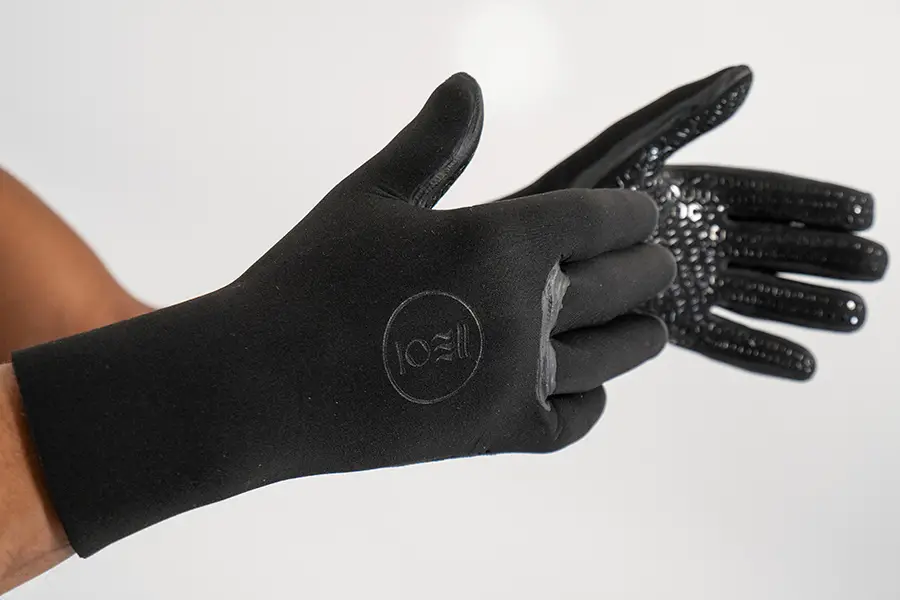For those people who do not know, neoprene is a synthetic material, not actual rubber. Its dexterity and durability make it a very popular choice for making gloves.
Neoprene is made of chloroprene (a type of lab-synthesized rubber). Various chemical reactions result in the formation of neoprene gloves with the help of the free radical polymerization process.
One of the better things about free radical polymerization is that it exempts the use of natural latex in neoprene gloves.
Neoprene gloves contain synthetic latex that doesn’t correlate to latex allergies caused by natural rubber. So, anyday, neoprene gloves are better than rubber gloves (the reasons will be discussed in detail later on in this guide).

Other than rubber gloves, the next gloves that neoprene gloves are most compared with are nitrile gloves.
There are many such questions about the use, applications, pros, and cons of neoprene gloves that we have answered in this guide.
Continue reading for all the details!
What are neoprene rubber gloves?
Neoprene rubber gloves should not be confused with rubber gloves. Neoprene gloves are synthetic gloves that are highly stretchable.
Hence, the best thing about these synthetic rubber gloves is that they offer snug-fitting that makes working very easy.
Hence, they can be easily worn for many hours before you dispose of them. Also, they’re one of the softest work gloves out there in the market.
What are neoprene gloves used for?
Neoprene gloves are multipurpose gloves. The different purposes (and industries) they can be used for are as follow:
1.) They can be used for gardening.
2.) They can be used by lab workers.
3.) They’re also used in industries where there’s a risk of greasing.
4.) They can be easily used as kitchen gloves.
5.) Since neoprene is highly waterproof, neoprene gloves can be used for diving.
6.) They’re a preferred choice for physicians, dentists, and the janitorial staff.

Some industries where you’ll find that neoprene gloves are preferred over other types of gloves include the following:
-
-
- Oil refineries.
- Printing presses and paintings industries.
- Jobs where waste disposal is needed.
-
Top 6 advantages of neoprene gloves
Many advantages of neoprene gloves are born out of the fact that they’re highly resistant to petroleum products. Have a look at the top six advantages (benefits) of wearing neoprene gloves.
#1 Neoprene gloves are waterproof and chemical resistant
Neoprene gloves are one of the rare gloves that offer real protection from water. The very fact that they’re an inseparable part of a wetsuit should explain the extent of protection they offer from the water.
On top of being waterproof, neoprene offers protection from mild acids in alcohol and other food products. They’re also effective in protecting the hands of lab workers.
However, expecting them to protect hands from hardcore acids like sulphuric acid or HCL isn’t a wise choice. As long as you respect the range of chemical protection that neoprene is designed to offer, your hands will stay safe.
#2 Neoprene gloves withstand grease and oil
Grease, oil, and other petroleum-based products cannot penetrate the surface of neoprene. That’s why, if you’re a mechanic or somebody working in the oil industry, neoprene gloves will offer a great deal of protection.
#3 Neoprene gloves are abrasion-resistant
Neoprene is quite strong. It can withstand wear and tear. Besides, these gloves are very stretchable. Thus, they will always return to their normal size and won’t rip apart if you stretch them a little too much.
#4 Neoprene gloves offer a snug-fitting
Again, it’s the high stretchability of neoprene gloves that makes them very comfortable to wear. They will offer a snug-fitting: neither tight nor loose. Hence, they won’t keep slipping while you’re holding a tool.
Naturally, this benefit will ensure that neoprene gloves will not interfere with your work productivity.
Besides, neoprene is soft too and it doesn’t cause latex allergies either. So, you can wear them comfortably if you’re allergic to latex in rubber gloves.
#5 Neoprene gloves are weather-resistant
Whether it’s wind, sunlight, UV rays, or water, neoprene gloves can offer protection from all these conditions. That’s why they’re called outdoor gloves as well as weather-resistant gloves too.
#6 Neoprene gloves offer an astounding grip
One of the reasons that dentists, and anybody working in moist conditions, can easily use neoprene gloves is that they’re non-slippery. Hence, you won’t lose your grip while working.
To put it simply, there’s hardly any other material that can offer wet grip, as well as neoprene gloves, do.
Top 5 differences between nitrile and neoprene gloves
Both nitrile and neoprene are synthetic materials. That’s where the confusion begins. Many people confuse these two materials to be the same. But, in reality, nitrile and neoprene are different.
Here we are citing 5 major differences between both the materials that’ll help you decide which of the two should you use.
1.) Weather resilience – Neoprene is better than nitrile gloves when it comes to protection against UV rays, water, ozone, and wind. So, if you’re looking for outdoor gloves, then neoprene will offer better protection.
2.) Flexibility – Although both nitrile and neoprene are synthetic materials, neoprene is more flexible.
3.) Chemical resistance – We’ve already stated that neoprene offers protection from mild to moderate acids. But, it’s nitrile that offers more chemical resistance out of the two.
4.) Puncture resistance – Ideally, both these materials resist punctures well. That’s why they’re used in the medical sector and automobile repair shops.
But, out of the two, it’s nitrile that’s more resistant to cuts. On the other hand, neoprene gloves are better at resisting impacts in comparison to nitrile gloves.
5.) Affordability – Neoprene gloves are more affordable than nitrile gloves.
What’s the difference between neoprene and rubber?
The first obvious difference is clear: natural rubber comes from the sap of rubber trees and neoprene is a synthetic rubber.
Other than that, 3 more differences between the two are as follows.
1.) Latex allergy – It’s rubber gloves that cause latex allergy. So, if you have a latex allergy and nitrile gloves are too expensive for you, there’s nothing better than neoprene gloves.
2.) Resistance to oil – Here again, neoprene gloves steal the cake. Rubber gloves don’t naturally resist oil. They have to be chemically treated to offer some sort of protection from oils. Neoprene, on the other hand, is highly resistant to oil; hence, resistant to stains.
One noteworthy fact about neoprene gloves is that over a period of time, they will become less waterproof. Hence, in comparison to rubber gloves, neoprene gloves turn out to be more expensive.
Finally, here’s what the debate might boil down to, which is better, neoprene or rubber? Well, in all honesty, it will always depend upon your budget and the kind of work you do. Also, if you have a latex allergy, then neoprene gloves are a suitable choice.
Top 2 cons of neoprene gloves
#1 Neoprene Gloves don’t stand the test of extreme snow cold
Did you know that neoprene gloves can protect from the cold due to water but they’re not that good at offering protection from snow cold?
Anything less than 60° F when it snows will start making neoprene gloves stiff. And temperatures below 30° F will hamper all the protection that neoprene gloves otherwise offer. The material won’t be that stretchable; hence, the gloves will become brittle.
Although you can wear them for skiing, if you’re somebody who has to work outside in the snow, neoprene gloves will not offer the right kind of protection.
#2 Neoprene gloves are not much breathable
Undoubtedly, neoprene gloves will keep you warm. But, if you have really sweaty palms, then there might be a problem!
Neoprene gloves aren’t very breathable. This is both a curse and a boon. It’s a boon when the surface doesn’t allow water to penetrate inside.
It’s a curse when your hands sweat or get wet due to any reason because just like neoprene gloves won’t let water seep inside, they won’t let water from sweat pass outside.
How do you treat an allergic reaction to neoprene?
Neoprene is usually used as an alternative to real rubber because real rubber contains Latex that can cause allergies.
But, even neoprene contains certain compounds that can result in skin dermatitis. Though it’s a rare event, it can still cause contact dermatitis.
In case you’ve suffered from an allergic reaction because of wearing neoprene gloves, here’s what you should do:
♦ Cool and wet pressing the affected area helps with the itching and inflammation. Make special efforts to not scratch the area.
♦ Visit a doctor and use medicated lotions and anti-itching creams on the affected area. Always keep your hands moisturized.
♦ If there’s pain accompanied by inflammation, your doctor might prescribe anti-inflammatory medications on top of topical creams and steroids.
FAQs
1.) Is neoprene good for gloves?
Yes. Neoprene gloves are waterproof, flame resistant, UV resistant, and cut and impact resistant.
On top of that, they’re used in many industries. They’re immensely flexible too. Hence, neoprene is a very good material to make gloves.
2.) Do neoprene gloves contain latex?
No. Neoprene does not contain natural latex. It has synthesized latex. And synthesized latex does not cause type 4 skin allergies that real latex causes.
3.) Can you be allergic to neoprene?
Though it’s rare, it’s possible. You can be allergic to neoprene. There’s a compound known as MBT that can cause allergies.
4.) Are neoprene gloves waterproof?
Yes. Neoprene gloves are extremely waterproof. They’re also used as a part of the wetsuits that divers wear. That’s one reason why neoprene gloves are also used as fishing gloves.
Concluding Thoughts
Neoprene gloves are made of chloroprene that’s a synthetic rubber. Since these gloves are flexible, weather-resistant, waterproof, and chemical resistant, they find use in many industries.
They’re different from both nitrile gloves and leather gloves. As long as you respect the limits of neoprene gloves, they will protect your hands whether you work in an oil refinery or the medical sector.







